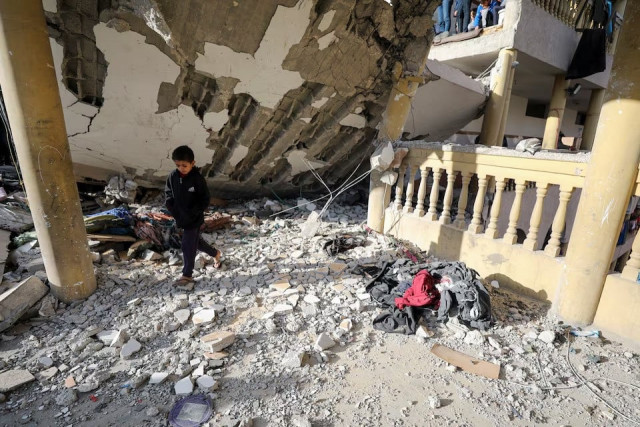Hopes dim for rapid end to Gaza conflict
Israel remains resolute in Gaza, aiming for Hamas's eradication despite Lebanon's peace agreement progress

Following the agreement to end over a year of conflict between Israel and Lebanon’s Hezbollah, focus has shifted back to the devastated Gaza Strip. However, any expectations of a swift resolution to the ongoing war in Gaza appear unlikely.
The ceasefire between Israel and Hezbollah came into effect early on Wednesday, halting hostilities that had escalated significantly in recent months and overshadowing Israel’s simultaneous conflict with Hamas in Gaza.
Announcing the Lebanon agreement on Tuesday, US President Joe Biden stated his intent to refocus efforts on achieving a resolution in Gaza, urging both Israel and Hamas to seize the opportunity.
Despite this, there is no indication that Israeli leaders intend to relax their campaign against Hamas group responsible for sparking the conflict last year by attacking southern Israel. Israeli ministers emphasised that their objectives in Gaza are distinct from those in Lebanon.
Israel’s Agriculture Minister Avi Dichter, a senior security official, underlined the government’s commitment to ensuring Gaza will no longer pose a threat, declaring that a decisive victory is their goal.
Prime Minister Benjamin Netanyahu has vowed to bring home the 101 Israeli hostages still held in Gaza and to dismantle Hamas entirely.
The prospects for negotiations remain bleak, with both sides accusing each other of intransigence. While a Hamas official expressed hope that the Lebanon ceasefire might facilitate a resolution in Gaza, Israel and the US have accused Hamas of negotiating in bad faith.
Prolonged conflict and its toll
The Gaza conflict has endured far longer than expected, devastating much of the territory. Over the past 14 months, approximately 44,000 Palestinians have been killed, and Israeli forces continue daily strikes in their campaign against Hamas.
The announcement of the Hezbollah ceasefire was met with despondency by many Gazans, who feel abandoned, though some hope it might signal a shift in focus toward ending the Gaza war.
Egypt, a key mediator, expressed cautious optimism. Egyptian officials revealed that Israel indicated a willingness to revisit Gaza negotiations if the Lebanese ceasefire holds.
US national security adviser Jake Sullivan confirmed that President Biden would intensify diplomatic efforts with key regional players, including Turkey, Qatar, and Egypt. However, with Donald Trump poised to assume the US presidency in January, Palestinians remain sceptical, recalling his staunch support for Israel and lack of clear plans for peace.
Separation of conflicts
The Lebanon agreement has been celebrated by Israeli and US officials for compelling Hezbollah, like Hamas, to disengage from the Gaza conflict. However, analysts warn that this separation could reduce external pressure on Israel to seek a resolution in Gaza.
Some observers suggest that Netanyahu may see political advantage in prolonging the war to maintain the unity of his coalition, which includes factions opposed to concessions in Gaza.
The families of Israeli hostages criticised the Lebanon deal, arguing that Hezbollah might have influenced Hamas to secure hostage releases in exchange for a ceasefire.
Hamas, for its part, demands the release of Palestinian prisoners and an Israeli withdrawal from Gaza, rejecting calls to disarm.
Israel’s leadership remains resolute, with Minister Dichter predicting a prolonged Israeli presence in Gaza and ruling out any future role for Hamas in the territory.



















COMMENTS
Comments are moderated and generally will be posted if they are on-topic and not abusive.
For more information, please see our Comments FAQ